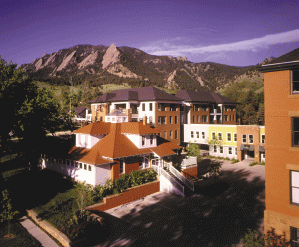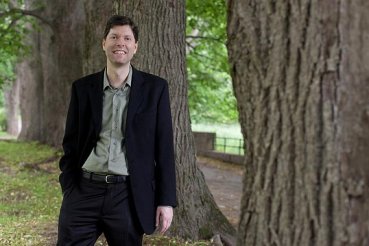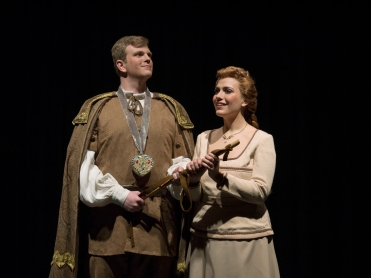First-rate performances of interesting repertoire
By Peter Alexander March 4 at 11:30 p.m.
The Boulder Piano Quartet is hidden in plain sight.

Boulder Piano Quartet
The group is made up of four well known, highly visible professionals from the front range area: violinist Charles Wetherbee and pianist David Korevaar from the CU College of Music, with violist Matthew Dane and cellist Thomas Heinrich. They present first-rate performances of interesting repertoire not often found on other concerts, and their concerts are free, making them the best chamber music deal you’ll find.
And yet they don’t have a very high profile, possibly because they don’t perform in the usual concert venues. Instead, they play at the Academy, a former girls’ school turned retirement community, which underwrites the concerts as enrichment for their residents. Performances are held in a former chapel, a large room with excellent acoustics, and are open to the public. Parking is easy to find in the neighborhood. Refreshments such as desserts or wine and cheese are provided at each performance.

The Academy in Boulder
In other words, there is no downside.
For the current season the BPQ has prepared four programs of which two remain, at 7 p.m. Fridays March 9 and May 4. The performance Friday of this week features music by Joaquin Turina, Pierre Jalbert and Dvořák. In May the program will comprise two large-scale late Romantic works by Zdenek Fibich and Richard Strauss.
Formed in the early 2000s, the quartet originally performed under the auspices of the Boulder Public Library. “We performed fairly regularly for a number of years, but around eight or nine years ago the library’s relationship with the performing arts was changing and things slowed down (for the quartet),” pianist David Korevaar explains.

Ruth Shanberge
More recently Ruth Shanberge, a patron of the arts and an Academy resident who passed away in 2017, arranged for Korevaar and violinist Charles Wetherbee to present chamber music at the Academy. That became the impetus to re-start the quartet.
“Ruth was all about music and its role in culture,” Korevaar says. “Bringing music to the Academy was an important mission for her. That’s why we are now in our third season of presenting concerts (there). This has been a wonderful arrangement for us, because the Academy has been very welcoming and supportive of what we do.”
The repertoire for piano quartet (violin, viola, cello and piano) is less well known than that for piano trio (violin, cello and piano). “It’s nothing like as rich as the trio repertoire,” Korevaar says, “but the quartet repertoire is extremely good. One of the things we’ve been trying to do is get outside of what would be standard for the piano quartet.”
The central works for piano quartet are two quartets by Mozart, plus three works by Brahms, one by Schumann and two by Dvořák. But as you move into the 20th century there are many more works to chose from, some of which are on the upcoming concerts.

Composer Pierre Jalbert
Of the works on Friday’s concert, Turina’s Piano Quartet was written in 1932, and Jalbert’s Secret Alchemy was premiered in 2012. The former is “a wonderful typical Turina piece, filled with Spanish bullfighter music,” Korevaar says. “It’s a wonderful piece. It’s not complex, it’s very attractive, and it’s beautifully put together and beautifully written for the ensemble. It’s quite fresh and it’s beautiful music.”
Jalbert currently teaches composition at Rice University and is known for his creative use of musical colors. The atmospheric movements of Secret Alchemy have suggestive titles, including “Mystical,” “Timeless, mysterious, reverberant” and “With great energy.”
The third piece on the program Friday is Dvořák’s First Piano Quartet. Even though it is one of the standard pieces for piano quartet, it is rarely performed. “A very beautiful piece, it does have some structural oddities,” Korevaar says. “The last movement is quite eccentric, but the music is beautiful, and it’s texturally very inventive. He does remarkable things in terms of each instrument and how he puts them together.”
The BPQ’s final concert of the spring will feature two works form the end of the 19th century, the Piano Quartet in E minor by Fibich and the Piano Quartet in C minor, an early work by Strauss. “That’s a very friendly program,” Korevaar says. ”It’s all this very central European kind of music. The gemütlickeit (warmth, or geniality) is very real, in the case of both of those pieces. So I think it’s an easy listening program.”
Of the two, the Strauss is the more difficult for the players. “Strauss likes to write to the extremes of all the instruments,” Korevaar says “As in his orchestral music, he’s interested in virtuosity. Everybody’s got a lot to do, and that makes it difficult to put together. But the music is wonderful.”
Although the Academy is a non-traditional location for concerts, Korevaar likes to play there. “It’s a slightly unconventional concert space, this former chapel in what was a girls’ school,” he says. “But it’s a wonderful space for chamber music. It’s a perfect large salon with a very high ceiling. The acoustics are very warm, and the strings sound great in that room.
“It’s a rewarding place to play, and there’s always a great ambience there.”
# # # # #
Boulder Piano Quartet
Charles Wetherbee, violin
Matthew Dane, viola
Thomas Heinrich, cello
David Korevaar, piano
7 p.m. Friday, March 9
Chapel Hall, The Academy, 970 Aurora Ave. (entrance off 10th St.), Boulder
Joaquin Turina: Piano Quartet
Pierre Jalbert: Secret Alchemy
Antonin Dvořák: Piano Quartet No. 1 in D major
Admission is free, but audience members are asked to RSVP at 303-938-1920.
7 p.m. Friday, May 4
Chapel Hall, The Academy, 970 Aurora Ave. (entrance off 10th St.), Boulder
Zdenek Fibich: Piano Quartet in E minor
Richard Strauss: Piano Quartet in C minor
Admission is free, but audience members are asked to RSVP at 303-938-1920.
 Bahman Saless and the Boulder Chamber Orchestra are returning to old territory and making new discoveries.
Bahman Saless and the Boulder Chamber Orchestra are returning to old territory and making new discoveries.













 The madrigal started as in-home entertainment in Italy but it was spread to England in 1588. In that year an important book, Musica Transalpina (Music from across the alps), was published in London containing Italian madrigals with their texts translated into English. This started a craze for madrigals in England.
The madrigal started as in-home entertainment in Italy but it was spread to England in 1588. In that year an important book, Musica Transalpina (Music from across the alps), was published in London containing Italian madrigals with their texts translated into English. This started a craze for madrigals in England.














